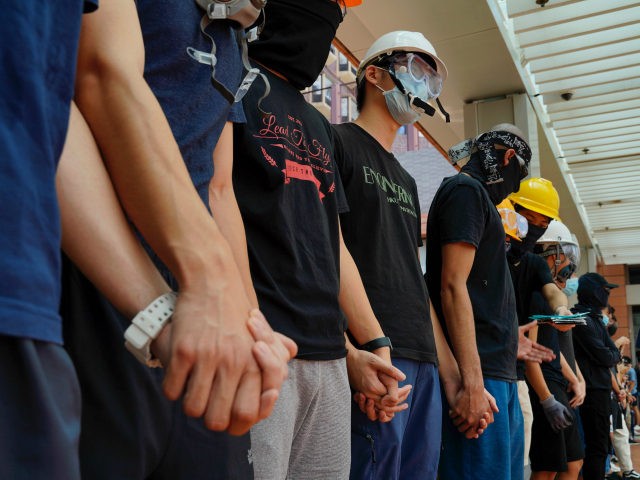Hong Kong Education Secretary Kevin Yeung sent a letter to school administrators on Wednesday instructing them to crack down on pro-democracy protests in advance of the national security law Beijing will soon impose on the island.
Yeung said students should be punished for “dangerous or unlawful” activities such as “chanting slogans, forming human chains, and posting slogans or singing songs which contain political messages at schools for expressing political stance.”
According to Yeung, such political activities tend to “compromise harmony on campuses, stir up other people’s emotions and make them feel stressed, and ultimately undermine the progress of learning.”
The education secretary reminded school administrators over the weekend that they can now call the police to arrest students who show disrespect to the Communist Chinese national anthem, since a recent law criminalized such mockery, with penalties including large fines and up to three years in prison.
Ironically, Yeung accompanied these instructions with assurances that China’s still-developing national security law will not infringe on free speech.
The Epoch Times reported on Wednesday that the education department in the Chinese province of Hunan is planning to recruit politically reliable teachers from various cities and send them to Hong Kong and Macau. The plan enraged Hong Kongers, who objected to China using their education system for political indoctrination.
In the Epoch Times’ translation of the Hunan document, there is nothing subtle about the initiative – it calls for teachers who “hold a solid political opinion,” “adhere to the principle of ‘One Country, Two Systems,’” and “love the country” to spend at least one year, and possibly two, observing and instructing local educators in Hong Kong and Macau.
The salaries for these teachers would be paid by the Hunan schools, which would be required to keep their positions available for when they return. Additional pay from the Hong Kong and Macau educational systems was also stipulated.
The Epoch Times noted that some programs along these lines were implemented in China as far back as the mid-2000s, but they never seemed to involve more than a handful of teachers and were not as specific about the political positions that had to be embraced by participants. At least one larger-scale and aggressively political education curriculum for Hong Kong was scrapped by the mainland after objections from the Hong Kong government in 2012.

COMMENTS
Please let us know if you're having issues with commenting.